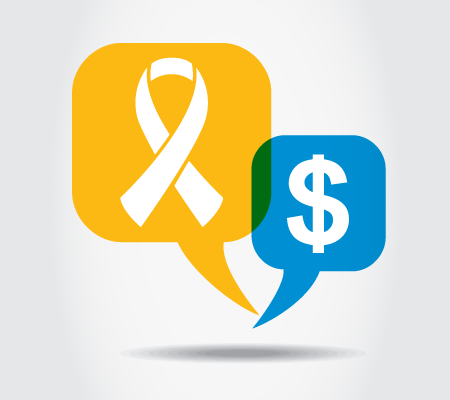 It’s no secret that diagnosis and treatment for cancer and other serious illnesses can be expensive.
It’s no secret that diagnosis and treatment for cancer and other serious illnesses can be expensive.
Even with health insurance, associated expenses may include high deductibles and copayments.
In addition medical care costs, you may have lost wages from being unable to work during your illness. Worry about health care coverage and costs can create even greater anxiety after treatment than at the time of diagnosis.
Talk is cheap
“No matter the type of health insurance you have, or if you have no insurance, it’s important for you to talk openly with your health care team about the cost of your care,” said Valerie Loizides, a managed care coordinator at Marshfield Clinic.
Loizides recommends asking questions suggested by the American Cancer Society:
- Will my health insurance pay for this treatment?
- How much will I have to pay myself?
- Where can I get an idea of the total cost of the treatment we’ve discussed?
- Are there other treatments that are less expensive?
- Where will I get treatment – in the hospital, clinic or at home?
- Does my health insurance company need to approve any part of the treatment before I start?
“Have these conversations after your diagnosis, during treatment and after you have completed treatment,” Loizides said.
Financial assistance for cancer treatment exist
Resources for assistance for treatment and other services are available to people in many situations and of varying income levels, said Loizides, who in her role, helps verify patient insurance benefits and obtain authorizations.
“Several organizations and companies help people and families who are experiencing cancer with medical billing, insurance and reimbursement issues,” she said.
One such coalition is the Cancer Financial Assistance Coalition, a group of financial assistance organizations that have joined to help cancer patients and survivors experience better health and well-being by limiting financial challenges.
“The coalition’s website includes a searchable database of local and national organizations providing financial assistance to people with cancer and their families,” Loizides said. “You can search the site for resources by diagnosis or by the type of financial assistance you need.”
Several nonprofit organizations also provide help for expenses such as drug copayments, deductibles and other medical costs including:
“Each program has its own eligibility rules and may only cover certain cancers,” Loizides said.
Health care law offers safeguards
Under the Affordable Care Act, safeguards have been established for people with a history of cancer and other serious illness. You can no longer be discriminated against because of a pre-existing condition.
Additionally, insurers can no longer impose dollar limits on essential health benefits for people with cancer and other chronic illnesses, and annual limits are being phased out.
Insurers also are required to cover several recommended preventive services to screen for cancer, diabetes and high blood pressure, without passing along cost sharing of copays or deductibles.
“Understanding your health insurance benefits and cost of treatment and follow-up, and knowing possible resources for financial assistance can help lower your anxiety and stress, allowing you to focus on your health,” Loizides said.
Ask your health care team about finance assistance counseling.

